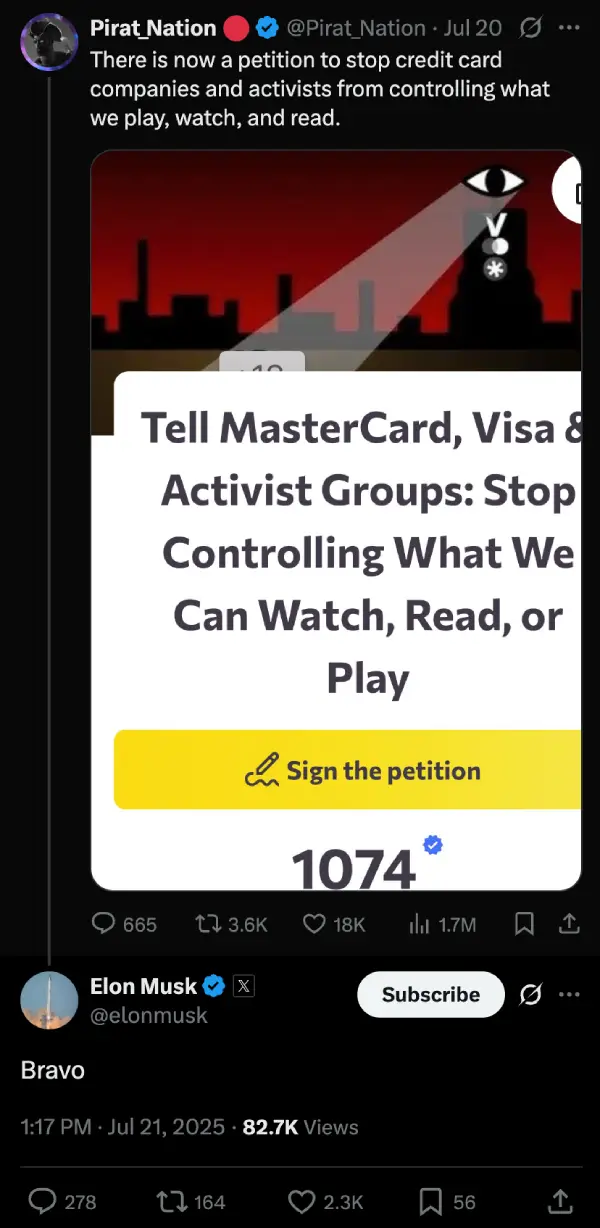GOG standing up against the censorship pic.twitter.com/rzTW76eGj0
— Pirat_Nation 🔴 (@Pirat_Nation) August 1, 2025
So the intense clash between gamers and corporate interests continues. The ongoing battle over adult games on platforms like Steam has pitted passionate developers and players against the immense power of payment processors, sparking a firestorm of controversy that shows no signs of slowing down.
It all kicked off when this Australian group called Collective Shout decided they’d had enough of certain adult games floating around online. Back in July, they fired off a letter to the big payment processors – you know, MasterCard, Visa, PayPal – basically saying “Hey, you’re helping fund games that depict rape, incest, and worse. Cut it out.” And wow, did that letter pack a punch.
Steam, that gaming behemoth we all know and love (or love to hate), quietly started pulling hundreds of adult titles from their store. No fanfare, no announcements – just poof, gone. Developers who’d been making a living off these games suddenly found themselves locked out of their own work.
But Steam wasn’t the only one scrambling. Itch.io, usually the cool indie kid on the block, went nuclear and de-indexed over 20,000 NSFW games from their search results. They called it a “time-critical moment” to save their payment processing, which is corporate speak for “we’re freaking out and don’t want to lose our money pipeline.” The thing is, it wasn’t just the extreme stuff getting caught in the crossfire. Games about queer relationships, romance stories, and even some pretty tame adult content got swept up too. That’s when people really started getting worried that this wasn’t just about the truly problematic content.
You know how the internet works – tell people they can’t have something, and suddenly everyone wants it twice as much. A Change.org petition demanding the payment companies back off hit over 200,000 signatures within no time. Social media also went absolutely wild. People were sharing screenshots, calling out what they saw as corporate overreach, and generally making a lot of noise. Even Elon Musk jumped in with a “bravo” for the pushback.
MasterCard tried to play it cool with a press release basically saying, “We didn’t do anything, we just follow the law, everything’s fine.” Visa also mentions something similar about their “high-risk content” policies. But then Valve – Steam’s parent company – came out with a different story in a statement to PC Gamer. They said payment processors had definitely reached out about “brand risks” and cited specific rules about not processing payments for stuff that could damage their reputation. When Valve tried to explain that they only host legal games, they got shut down. It’s giving major “he said, she said” vibes, except with billion-dollar corporations.
Remember when OnlyFans almost banned adult content back in 2021? Same playbook – payment processors get nervous, platforms panic, creators suffer. That time, the backlash was so intense OnlyFans reversed course within days.
Some developers, especially those making LGBTQ+ themed games, are saying this feels like a targeted culture war attack.
But here’s where it gets interesting. The gaming community didn’t just complain online – they got organized. People started mass-calling Visa and MasterCard customer service lines. Some reported reps hanging up on them, others got scripted responses, but the sheer volume of calls definitely got noticed. GOG really stepped up with their “FreedomToBuy” campaign, giving away 13 free adult games that had been delisted elsewhere.
Over a million people claimed them on the first day alone. Their message was pretty clear: once you download our DRM-free games, they’re yours forever, no matter what payment processors decide later.
In 24 hours, one million people have claimed the FreedomToBuy games and shown their support.
— GOG.COM (@GOGcom) August 3, 2025
The response is so much beyond our expectations that our team needs to work around the clock to maintain the stability of the platform.
For people who had difficulties claiming the… pic.twitter.com/ppIsRGZloy
It’s not all doom and gloom. Itch.io started putting some free NSFW games back up (since free games don’t involve payment processors), and Steam’s offering credits to affected developers for future releases that play nice with the new rules. But the bigger picture? This might need a legislative fix. There’s actually a bill from Senator Kevin Cramer that would stop banks and card companies from refusing to work with legal businesses, which could protect these games if it passes.
As of right now, nobody’s backing down. Collective Shout is standing by their campaign, saying companies have every right to choose what they support based on their values. Meanwhile, gamers are arguing this is about adult freedom of choice, not letting outside groups decide what’s acceptable for everyone else.
With things like the UK’s age verification laws adding more complexity to the mix, this whole debate about what’s “acceptable” in gaming could keep going for a while. And honestly? Based on how fired up both sides are getting, it probably will. One thing’s for sure – this community knows how to make noise when they feel like their rights are being trampled on. Whether that noise will actually change anything remains to be seen.
TechIssuesToday primarily focuses on publishing 'breaking' or 'exclusive' tech news. This means, we are usually the first news website on the whole Internet to highlight the topics we cover daily. So far, our stories have been picked up by many mainstream technology publications like The Verge, Macrumors, Forbes, etc. To know more, head here.



